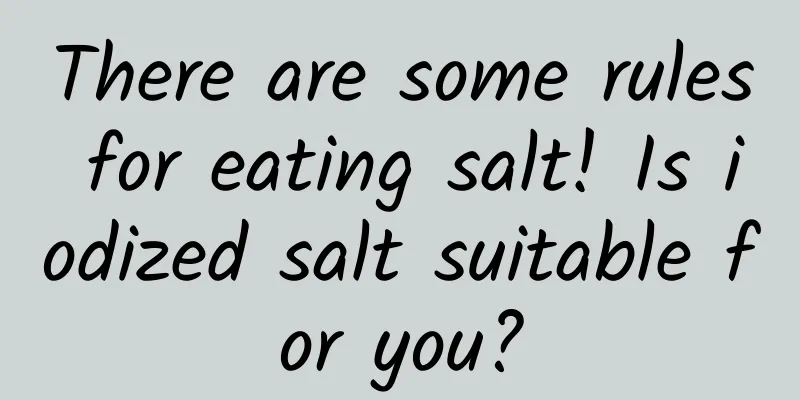There are some rules for eating salt! Is iodized salt suitable for you?

|
This is the 4798th article of Da Yi Xiao Hu Iodine is an important component of thyroid hormones and plays a vital role in the synthesis of thyroid hormones. Iodine is taken up in the thyroid gland and, after a series of reactions, produces thyroid hormones, which affect the body's metabolism and physiological functions through the circulatory system. It plays an important role in the growth and development of the human body. Both excessive and insufficient iodine intake will affect the thyroid gland. Insufficient iodine intake will lead to reduced thyroid hormone secretion, which in turn will cause hypothyroidism. Hypothyroidism will lead to abnormal proliferation of thyroid follicular cells and thyroid tissue, and eventually thyroid nodules or goiter will appear. When women are pregnant, the reduced thyroid hormone secretion caused by iodine deficiency can lead to intellectual retardation and physical abnormalities in children after birth. Excessive iodine intake will lead to increased secretion of thyroid hormones, which will in turn cause hyperthyroidism. Hyperthyroidism can cause symptoms such as anxiety, hand tremors, sweating, weight loss, and increased heart rate, which seriously affect the patient's quality of life. As the saying goes, everything goes to extremes, hyperthyroidism can lead to excessive synthesis and release of thyroid hormones, and long-term excessive thyroid hormone stimulation can inhibit the function of the thyroid gland, thereby reducing the production and release of thyroid hormones. This phenomenon is called thyroid suppression. Thyroid suppression can lead to a series of problems, such as fatigue, depression, constipation, decreased body temperature, slow heart rate, etc. For people who already have thyroid nodules, excessive iodine intake may also lead to the growth of thyroid nodules. Therefore, both excessive and insufficient iodine intake can lead to serious thyroid disease. Maintaining an appropriate amount of iodine intake is essential for maintaining thyroid health. So the question is, how do you determine whether you are consuming enough iodine? First, observe your daily eating habits. If you often consume iodized salt and seafood (marine fish, kelp, seaweed, etc.), then you are likely to have consumed enough iodine. In addition, seafood is rich in iodine. If you live in a coastal city, your iodine intake will be more sufficient than that of residents in inland cities. So which groups of people may have insufficient iodine intake? I have listed the following situations: 1. Pregnant and lactating women: Because they have a high demand for iodine, insufficient iodine intake may have adverse effects on the intelligence and growth and development of the fetus. 2. Children and adolescents: Because their bodies are developing, iodine is essential for normal growth and development. 3. Inland and plateau areas: Since these areas are far away from the ocean, local residents have relatively fewer opportunities to consume seafood and their iodine intake is relatively low. 4. Geographically remote areas: Due to inconvenient transportation, it may be difficult to supply iodine-rich foods such as seafood, so local residents may also face the problem of insufficient iodine intake. 5. Underdeveloped remote areas: Due to economic constraints and a single dietary structure, people may have insufficient opportunities to consume iodine-rich foods, leading to insufficient iodine intake. 6. In areas with certain specific geological structures: For example, areas containing coal fields, salt-containing crystalline rock layers or limestone geological structures, the iodine content of groundwater may be low. The above situations may lead to insufficient iodine intake. In response to these situations, relevant departments need to take measures, such as encouraging people to eat iodized salt to help solve the problem of insufficient iodine intake and prevent the occurrence of iodine deficiency diseases. For the general healthy population, consuming iodized salt can be a way to maintain an adequate iodine intake, as iodine is one of the essential trace elements for the human body. However, excessive intake of iodine may also have a negative impact on health, so it is not recommended to consume excessive amounts of iodized salt for a long time unless under the guidance of a doctor! Author: Shanghai Fifth People's Hospital Affiliated to Fudan University Li Yujin |
>>: Mysterious oriental power! Fermented tofu becomes "Chinese cheese", how attractive is it?
Recommend
Growth plan for Dewu (Doudu) trendy e-commerce platform
When doing data analysis, we must constantly stre...
Electric Technology Car News: Changan CS55 released, can the shortcomings of the independent SUV market be made up?
With the continuous efforts of domestic automaker...
Can black holes devour matter without restraint? Wrong! Learn more about magnetically trapped accretion disks
The vast and deep universe has attracted countles...
Can you write high-quality Objective-C code?
Dot notation syntax Properties and idempotent met...
The jokes will make you understand what Internet thinking, big data, O2O, crowdfunding, red ocean and blue ocean are in seconds!
[[145188]] What is big data? The phone rang at a ...
Using Didi Tickets to Talk About Product Demand, Experience, and Self-propagation
On August 9, Didi launched an innovative product ...
WeChat’s turnaround is harder than an elephant
Zhang Xiaolong, the "Father of WeChat",...
YOYO Reading Long and Difficult Sentences Class
YOYO Reading Long and Difficult Sentences Class R...
China Association of Automobile Manufacturers: A brief analysis of the sales of the top ten SUV manufacturers in January-February 2023
According to statistics and analysis by the China...
Avoid detours: advice for Java programmers with 1 to 5 years of experience
Today, I am going to share some practical informa...
Even if they are not related, people who look alike share a lot of the same DNA?
Are there two people in the world who look extrem...
How to sell popular products in the era of private domain traffic?
What is a hot product? Not only do we need to mak...
Is the smart bracelet just a transitional product?
Estimated global shipments of wearable electronic...
Did the US military once remove alien bodies from a flying saucer? What did the US Congressional UFO hearing say?
UFOs are trending again. This time, the protagoni...
Microsoft will shut down Sway for iOS at the end of the year
[[241271]] Microsoft announced that it will shut ...









